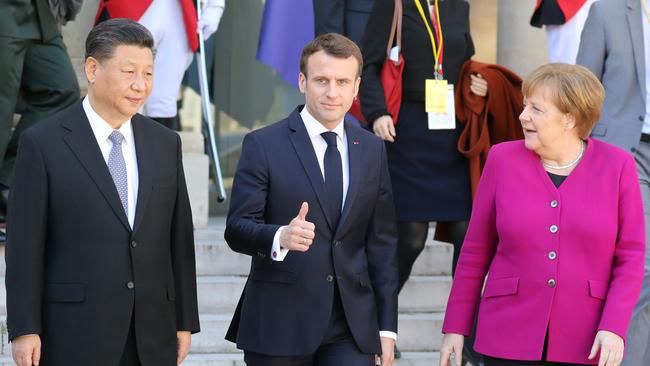Britain is being left on the outside looking in at vital EU-China talks

There is hardly a more consequential issue facing all of Europe — including Britain — than its future relationship with China. This is an issue on which the EU has until now been remarkably complacent. Over the past decade, during which the EU was hit by a succession of existential crises, it preferred to look at fast-growing China as a source of business opportunities. Trade has flourished, making the EU China’s biggest trading partner and China the EU’s second-biggest trading partner. More than €1 billion ($1.6bn) of trade flows between the EU and China every day. The EU exported €198bn of goods to China and imported €375bn. As recently as two years ago, the EU even believed that China could be a strategic partner in its efforts to defend the global multilateral trading system following the election of Donald Trump.
Yet now a new realism has settled in. In a hard-hitting report published this month, the commission warned that China had become “a systemic rival promoting alternative models of governance”. That is a major shift. When China joined the World Trade Organisation in 2001, the West was so confident in the superiority of its own system that it allowed China entry even though it fell far short of the core requirement that all WTO members be market economies. The West assumed that as China prospered, it would adopt Western models of economic and political governance. Instead, Brussels has had to recognise that China has shown little interest in reforming an authoritarian, state-driven economic system that appears to have served it so well. Now Brussels acknowledges that: “China is no longer a developing country. It is a key global actor and leading technological power.”
Moreover, China is using this power — both at home and abroad — in ways that pose direct risks to EU interests. European firms are not on a level playing field when competing with Chinese firms. China keeps its domestic markets for its own national champions, which are shielded from competition by restrictive licensing and investment conditions, massive subsidies, to state-owned and private companies, closed procurement markets and weak enforcement of intellectual property rights. EU operators have to submit to onerous requirements to access the Chinese market, such as creating joint ventures with local companies and the transfer of key technologies. Of concern to Britain is financial technology.
At the same time, the EU is concerned that Beijing’s activities in the South China Sea and its refusal to accept the rulings of international tribunals creates uncertainties over vital sea lanes. There is also growing concern that Beijing’s Belt and Road Initiative, China’s infrastructure investments on non-commercial terms in the western Balkans and Africa, is leading to debt bondage and handing China control of strategic assets while undermining incentives for good governance and the rule of law among the EU’s neighbours.
The risk for Europe is that it finds itself caught in the middle between the US and China as they seek to refashion the global trading system to suit their own interests. Yet what can Europe do? Brussels has proposed rules to screen foreign investment, to block foreign companies from participating in government procurement markets, unless there is reciprocity, to change EU law to make it easier to target foreign subsidies and to develop a common EU approach to the security of 5G. These ideas might find favour in France and Germany, which after years of benefiting from trade with China now feel threatened by subsidised Chinese competitors. But some northern European countries are rightly resisting any lurch towards protectionism. The answer to Chinese state capitalism cannot be European state capitalism, with European national champions shielded from foreign competition in an increasingly politicised single market.
But is it too late to create a European position? One result of the EU’s decade of crisis is that Beijing has been able to forge strong bilateral relations with capital-hungry southern and Eastern European countries, who increasingly benefit from Chinese investment. China already owns Greece’s largest port, Piraeus, and has invested heavily in transport infrastructure across Eastern Europe, where it meets regularly with member states as part of its 16+1 initiative. This week, to the consternation of Berlin and Paris, Xi signed a memorandum of understanding with Italy regarding future investment in Italian infrastructure.
How this plays out matters to Britain. It is not in its interest for the EU to adopt more protectionist policies that might end up being turned against British firms when it becomes a third country outside the EU.
It is in Britain’s interest that Europe works together to reform and defend the multilateral trading system, given Britain will be even more reliant on it outside the EU. Britain’s challenge will be to try to influence EU decision-making from the outside. A China-EU summit is scheduled to take place on April 10. Fortunately, thanks to the extension of Article 50, Britain will still be a member. May should make sure she is there.
The Times



The past week has been full of reminders of Britain’s new-found isolation. There were the stories of Theresa May’s lonely takeaway dinner in Brussels as the other 27 EU leaders debated whether to allow Britain an extension of Article 50. There were the pictures of the empty space she left in the EU leaders’ family photo at the end of what was supposed to be Britain’s last EU summit. But perhaps most telling was the Prime Minister’s absence from a dinner in Paris hosted by President Emannuel Macron for President Xi Jinping of China on Tuesday at which Germany’s Angela Merkel and the European Commission president Jean-Claude Juncker discussed EU-China relations. That followed a session a few days earlier that May missed as she raced back to London to save her deal and political career.